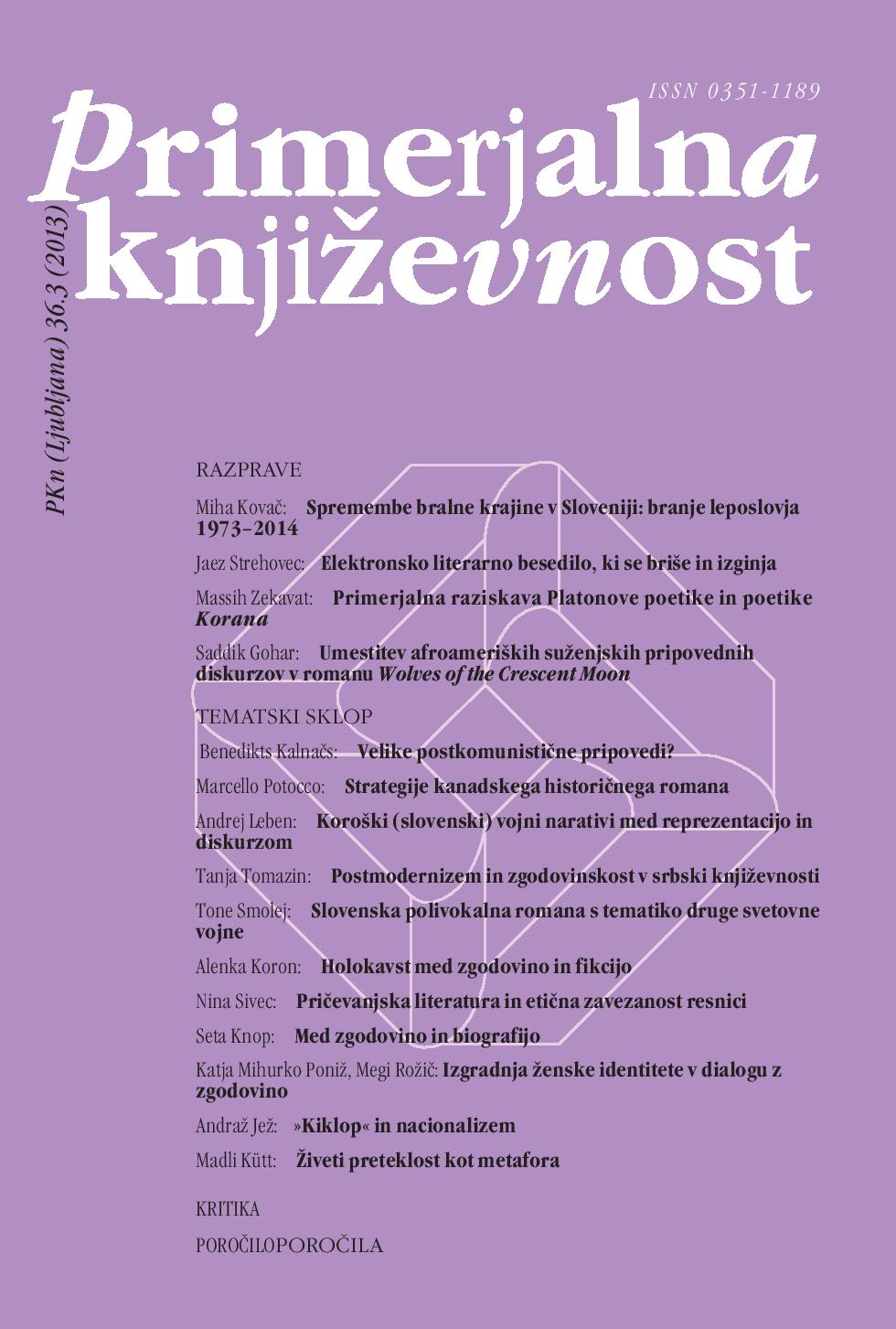Holocaust Between History and Fiction: The Case of Littell’s Novel The Kindly Ones
Keywords:
literature and history, war novel, World War II, holocaust, historical novel, historiographic metafiction, French literature, Littell, JonathanAbstract
Since it was published in September 2006, Jonathan Littell’s internationally bestselling novel The Kindly Ones has been subjected to controversies: enthusiasm and affirmative opinions are in sharp contrast with refusal in explicitly unfavourable ones. This kind of readers’ response is being repeated with each new translation into another language, and the Slovenian reception is no exception to the rule. – After a brief delineation of foreign and Slovenian reception I treat a few innovations of the novel that are used in representations of the holocaust in an attempt to include them into affirmative outline of the work. One of the key characteristics is the perspective of the first person narrator, who is a Nazi criminal and not a victim; although this perspective is not a complete novelty in literature it is certainly being very radically used and has brought filmic vividness into descriptions of terrible crimes and also the administrative backgrounds of the massive extermination of the Jews. Already the incipit of Chapter 1 (“Toccata”) is an apostrophe to the reader that contains at the same time an allusion to Villon (also to Baudelaire and Céline), and the core of the relationship between fiction and history preserved throughout the novel: the controversial subjective I, who is not only an infamous criminal, doctor in law, a cultivated musical and literary connoisseur, but also a victim (he loses his father at an early age, is a homosexual in the SS, a wounded soldier on the eastern front, a victim of severe air bombings in Berlin), and on the other hand an intention to tell “how it all happened” (wie es wirklich geschehen) alluding to the representation of historical events. But despite the huge amount of documentary material the connections of the novel with history are not unambiguous, since it contains many entirely fictional elements (e.g. protagonist’s hallucinations, his grotesque encounter with Hitler, rich intertextuality including the underlying mythological framework of Oresteia in the background) that may come as a disappointment to the readers, who expect to find predominantly historical motivations and descriptions. – The Kindly Ones is therefore not a “classical” historical novel written in a realist manner. It is not even an “ordinary” war novel or just a fictional autobiography and neither is it a dime novel. Because of its rich intertextuality, mise en abyme, and high degree of fictional self-reflexivity it can be, in accordance with Grethlein, more appropriately labelled as historiographic metafiction.References
Aristoteles. Poetika. Prev. Kajetan Gantar. Ljubljana: Študentska založba, 2005.
Asholt, Wolfgang. »A German Reading of the German Reception of The Kindly Ones.« Writing the Holocaust Today: Critical Perspectives on Jonathan Littell’s The Kindly Ones. Ur. Aurélie Barjonet in Liran Razinsky. Amsterdam in New York: Rodopi, 2012. 221–238.
Barjonet, Aurélie in Liran Razinsky: »Introduction.« Writing the Holocaust Today: Critical Perspectives on Jonathan Littell’s The Kindly Ones. Ur. Aurélie Barjonet in Liran Razinsky. Amsterdam in New York: Rodopi, 2012. 7–16.
Grethlein, Jonas. Littells Orestie: Mythos, Macht und Moral in Les Bienveillantes. Freiburg in Breisgau: Rombach, 2009.
Hahn, Hans-Joachim. »‘Morality’ and ‘Humanness’: Reading Littell with Speer, Fest, Syberberg and Others.« Writing the Holocaust Today: Critical Perspectives on Jonathan Littell’s The Kindly Ones. Ur. Aurélie Barjonet in Liran Razinsky. Amsterdam in New York: Rodopi, 2012. 201–217.
Hirsch, Marianne. »The Generation of Postmemory.« Poetics Today 29.1 (2008): 103–128.
Husson, Édouard in Michel Terestchenko. Les Complaisantes : Jonathan Littell et l’écriture du mal. Pariz: François-Xavier de Guibert, 2007.
Koppenfels, Martin von. Schwarzer Peter: Der Fall Littell, Die Leser und die Täter. Götingen: Wallstein, 2012.
– – –. »The Infamous ‘I’: Notes on Littell and Céline.« Writing the Holocaust Today: Critical Perspectives on Jonathan Littell’s The Kindly Ones. Ur. Aurélie Barjonet in Liran Razinsky. Amsterdam in New York: Rodopi, 2012. 133–149.
Leiler, Ženja. »‘Holokavst kot panoptikon norosti?’: Nemci odklonilno do romana Jonathana Littella.« Delo 50.64 (2008): 13.
Littell, Jonathan. Les Bienveillantes. Pariz: Gallimard, 2006.
– – –. Sojenice. Prev. Vesna Velkovrh Bukilica. Ljubljana: Mladinska knjiga, 2012.
– – –. »Najtežje je sprejeti, da ostudnih grozovitosti niso zagrešile pošasti: Goncourtova nagrada.« Prev. Alenka Zgonik. Delo 48.258 (2006): 19.
Littell, Jonathan in Florent Georgesco. »Edino, kar me zanima, je to, kako so se stvari zgodile: Pogovor z Jonathanom Littellom.« Prev. Tadeja Šergan. Ampak: mesečnik za kulturo, politiko in gospodarstvo 7.11 (2006): 33–35.
Markelj, Milan. »Junak z dna pekla našega časa: Jonathan Littel [sic!]: Sojenice.« Živa: priloga Dolenjskega lista 10.4 (2011): 34.
Popkin, Jeremy. »A Historian’s View of The Kindly Ones.« Writing the Holocaust Today: Critical Perspectives on Jonathan Littell’s The Kindly Ones. Ur. Aurélie Barjonet in Liran Razinsky. Amsterdam in New York: Rodopi, 2012. 187–200.
Prince, Gerald. »Disnarrated, The«. Routledge Encyclopedia of Narrative Theory. Ur. David Herman et al. London in New York: Routledge, 2005. 118.
Puhar, Alenka. »Literatura ekscesa, transgresije, otrok markiza de Sada.« Pogledi: umetnost, kultura, družba 1.19–20 (2010): 14.
Raciti, Giuseppe. Ho visto Jünger nel Caucaso: Jonathan Littell, Max Aue e Ernst Jünger. Milano in Udine: Mimesis, 2013.
Renko, Manca G. »Največje delo zadnjih desetletij ali nacistični kič? Kontroverzni roman Sojenice v slovenščini.« Delo 53.38 (2011): 15.
Toker, Leona. »The Kindly Ones and the ’Scorched Earth’ Principle.« Writing the Holocaust Today: Critical Perspectives on Jonathan Littell’s The Kindly Ones. Ur. Aurélie Barjonet in Liran Razinsky. Amsterdam in New York: Rodopi, 2012. 153–163.


